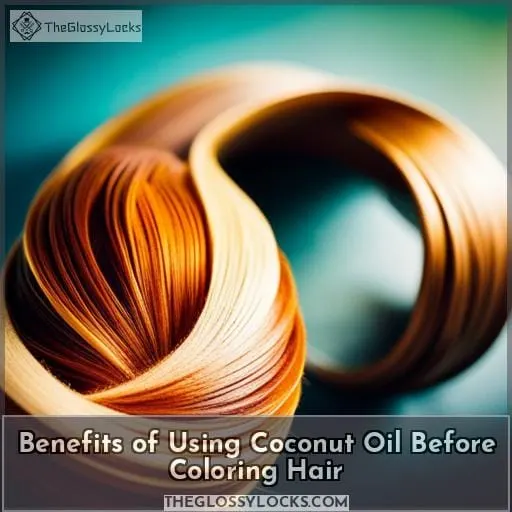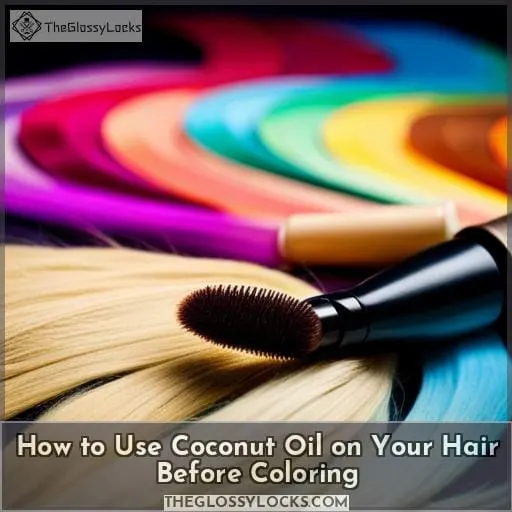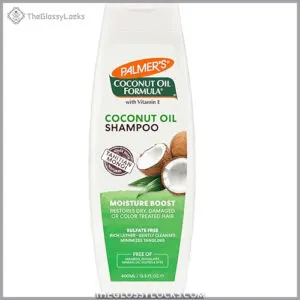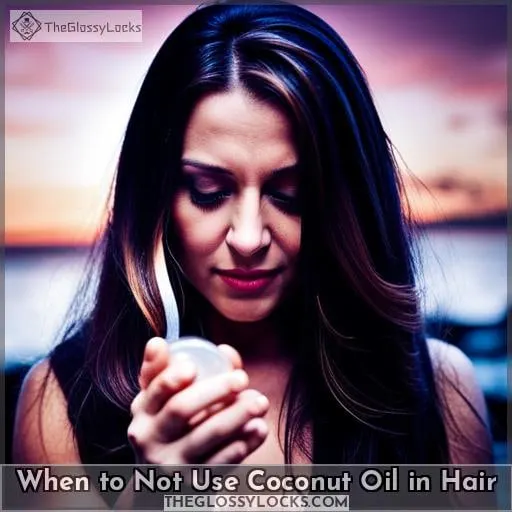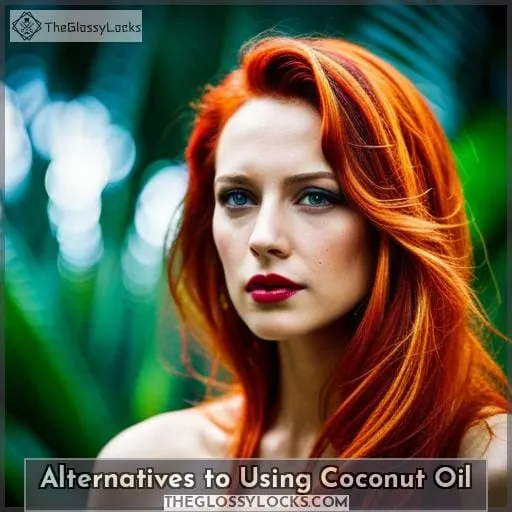This site is supported by our readers. We may earn a commission, at no cost to you, if you purchase through links.
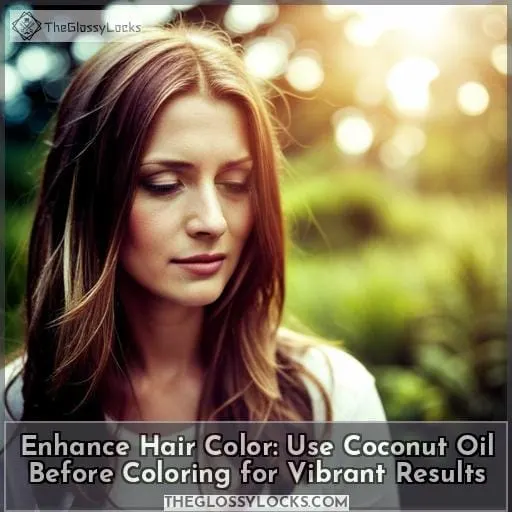
Discover the secrets to luscious, long-lasting results in this guide on how to use coconut oil before coloring your hair. From nourishment and hydration to preventing chemical damage, this article unveils the benefits and step-by-step instructions for achieving that radiant look.
Elevate your hair care game and embrace the vibrant, stunning results of combining coconut oil with your coloring routine.
Table Of Contents
- Key Takeaways
- Benefits of Using Coconut Oil Before Coloring Hair
- Will Coconut Oil Affect the Hair Dye?
- How to Use Coconut Oil on Your Hair Before Coloring
- Best Coconut Oils for Hair
- Can Coconut Oil Damage Hair?
- When to Not Use Coconut Oil in Hair
- Aftercare
- Alternatives to Using Coconut Oil
- Is Henna Good for Your Hair?
- Which Brands of Henna Hair Dye Are Best?
- Frequently Asked Questions (FAQs)
- Does coconut oil lighten hair color?
- Can I leave coconut oil in my hair overnight before coloring it?
- How often should I use coconut oil on my hair between color treatments?
- Does coconut oil help cover grey hair when coloring?
- What happens if I get coconut oil on my scalp when applying it before coloring my hair?
- Conclusion
Key Takeaways
- Coconut oil provides nourishment, hydration, frizz elimination and protection from chemical damage when used before coloring hair.
- Applying coconut oil before coloring hair helps prevent protein loss and strengthen hair follicles, reducing the chances of damage or hair loss during the coloring process.
- Cleansing hair thoroughly and applying coconut oil generously the night before coloring allows maximum benefits and protection.
- Gentle hair care with sulfate-free products and continued coconut oil application helps sustain hair health, color vibrancy, and longevity after coloring sessions.
Benefits of Using Coconut Oil Before Coloring Hair
Prepare to elevate your hair coloring experience by harnessing the power of coconut oil.
Begin with nourishment and hydration, as coconut oil deeply penetrates the hair shaft, preventing protein loss during bleaching and coloring.
Bid farewell to frizz as this natural remedy acts as a superior leave-in conditioner, forming a protective barrier against chemical damage and environmental factors.
Explore the preventive benefits against protein loss, chemical damage, and even hair loss, all while ensuring your hair dye stays vibrant and unaffected.
Nourishment and Hydration
Prevent hair protein loss and infuse deep nourishment by applying coconut oil before coloring, ensuring your locks remain vibrant and healthy throughout the process.
Coconut oil’s unique hydration techniques penetrate the hair shaft, promoting moisture retention and scalp health. Acting as a powerful deep conditioner, it repairs and protects, setting the stage for optimal color absorption.
Make this pre-coloring ritual a staple for vibrant, moisturized hair that stands out with a lustrous sheen.
Frizz Elimination
Taming frizz and promoting overall hair health, applying coconut oil before coloring acts as a protective shield against chemical damage and environmental factors.
- Smooth Strands: Achieve silky, smooth hair.
- Natural Shine: Enhance your hair’s natural shine.
- Protective Barrier: Guard against chemical assault.
- Chemical Defense: Shield against color-stripping chemicals.
Embrace a frizz-free finish and vibrant color with coconut oil’s unparalleled care for your hair.
Chemical Damage Prevention
Guard your hair from the potential damage of coloring chemicals by applying coconut oil, providing a protective barrier against harmful substances and maintaining the health of your locks.
| Benefit | How Coconut Oil Helps |
|---|---|
| Prevents Overuse | Coconut oil can help prevent you from overusing hair dye, which can damage your hair. |
| Color Retention | Coconut oil can help your hair retain its color longer. |
| Application Techniques | Coconut oil can be applied to your hair in a variety of ways, depending on your desired results. |
| UV Protection | Coconut oil can help protect your hair from UV damage. |
| Styling Compatibility | Coconut oil is compatible with most styling products, so you can use it with your usual hair care routine. |
Protein Loss Prevention
In addition to preventing chemical damage, coconut oil aids in preventing protein loss, vital for chemically treated hair. Its protein-strengthening properties nourish and strengthen your hair, preserving its resilience during coloring.
This natural treatment penetrates deeply, fortifying the hair cuticle against damage and offering essential protein preservation. Embrace coconut oil’s benefits to maintain hair health and resilience against chemical damage, ensuring vibrant, strong hair post-coloring.
Hair Loss Prevention
To prevent excessive hair loss when coloring, applying coconut oil serves as a proactive measure for nurturing and protecting your hair strands.
- Regular scalp massages stimulate follicles.
- Adjusting your diet aids hair health.
- Embrace a holistic approach to care.
- Lifestyle changes contribute to stronger hair.
- Coconut oil shields against chemical damage.
Will Coconut Oil Affect the Hair Dye?
You’re now wondering if coconut oil will affect the hair dye.
| Oil Absorption | Color Retention | Dye Interaction |
|---|---|---|
| Coconut oil penetrates the hair shaft, conditioning from within. | It helps lock in hair color for longer lasting vibrancy. | Doesn’t react negatively with hair dye chemicals. |
| Improves dye absorption for better results. | Slows fading by maintaining hair integrity. | Safe to apply before and after coloring process. |
| Hydrates hair to receive rich, even color. | Extends color longevity between salon visits. | No stripping elements that affect dye performance. |
Coconut oil has no acidic or harsh ingredients that interfere with the dyeing process. You can safely apply it before and after coloring without concern. The oil is fully absorbed into each strand, keeping hair strong and healthy to hold onto rich color.
How to Use Coconut Oil on Your Hair Before Coloring
First, thoroughly cleanse your hair to remove any product buildup.
Next, generously apply coconut oil the night before your hair appointment and cover with a shower cap.
Finally, follow your regular hair coloring routine, remembering to incorporate coconut oil into your long-term hair care regimen for continued vibrancy.
Clean Your Hair
Before applying the coconut oil, wash your hair with a gentle, sulfate-free shampoo to remove product buildup without stripping oils. This preps your hair and scalp for optimal color vibrancy by clearing away residue while maintaining natural moisture balance.
Choose a specialized color-safe formula catering to your hair type. Consider incorporating scalp massage to boost circulation, nourishing hair follicles.
Apply Coconut Oil Before Bed
Apply the coconut oil to your hair the night before coloring for optimal absorption and protection.
- Massage the oil into your hair, focusing on the midshaft and ends.
- Twist hair into a loose bun and secure with a clip, allowing the oil to fully penetrate overnight.
The coconut oil will deeply nourish strands, leading to better color retention.
- It forms a protective barrier, enabling color molecules to better cling to natural hair proteins.
- Using it as an overnight hair mask boosts shine and vibrancy the next day.
Bleach and Dye Hair as Usual
One can proceed to bleach and dye hair as usual after applying coconut oil the night before coloring.
The oil forms a protective barrier, shielding strands during the coloring process without affecting dye uptake.
Follow your regular hair sectioning and application techniques.
Rinse, condition gently, and style as normal afterwards.
The coconut oil preserves hair health throughout, enabling vibrant results.
Now continue coloring with peace of mind.
Wash and Condition Hair With Gentle Shampoos
Wash your hair with gentle, sulfate-free shampoos after coloring to maintain hair health.
Rinse thoroughly post-coloring, massaging the scalp to stimulate blood flow.
Choose a hydrating conditioner to smooth hair, seal in moisture, and prevent color fading.
Nourish strands by applying coconut oil from mid-shaft to ends and avoid roots when conditioning to maximize color vibrancy.
Skipping harsh detergents preserves your bright, rich hue.
Make Coconut Oil a Part of Your Hair Care Regimen
Integrate coconut oil into your regular hair care regimen by applying it before and after coloring for optimal hydration and to enhance hair dye longevity.
Massage coconut oil into your scalp and hair overnight once a week as an intensive treatment. The extra absorption time allows coconut oil to penetrate the hair shaft for added strengthening benefits.
Use it as a pre-wash conditioner or leave-in treatment in your weekly hair routine to maintain scalp health and keep strands nourished between salon appointments.
Applying coconut oil both before and after coloring helps the hair better absorb nutrients and protects from damage.
Best Coconut Oils for Hair
For vibrant hair color results, incorporate quality coconut oils into your routine.
We recommend:
- OGX Coconut Hair Mask to repair and soften hair
- Palmer’s Coconut Oil Shampoo to restore moisture
- Okay’s Coconut Oil for scalp and skin issues
- Biolage Shampoo for long-lasting color protection
Use these top coconut oil hair products regularly before and after coloring for optimal hair health and shine.
OGX Coconut Hair Mask 6oz
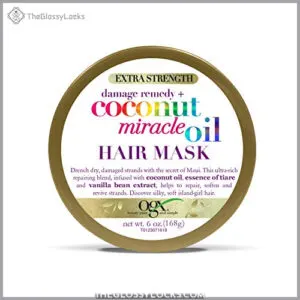
Revive dry, coarse hair with OGX’s extra-strength coconut oil hair mask, featuring hydrating and nourishing ingredients minus harsh sulfates or parabens. This 6-ounce deep conditioning treatment calms frizz and flyaways while locking in moisture.
Made with coconut oil, vanilla bean extract, and tiare essence, it smells of coconut milk, tangerine, and warm vanilla.
- Extra hydrating formula
- Pleasant tropical scent
- Softens and smoothes hair
- Good value
- Can make hair oily or flat
- Small container size
- May not moisturize enough
Biolage Color Last Shampoo
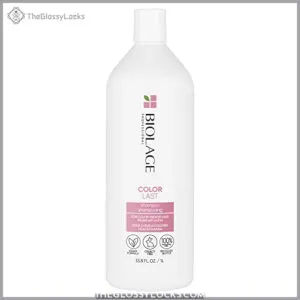
You’ll find the Biolage Color Last Shampoo works wonders when seeking a top-tier color-safe formula that gently cleanses and nourishes color-treated locks. As part of the Color Last Collection, this shampoo prevents unnecessary color stripping while providing salon-vibrant color for up to 9 weeks.
Formulated with nature’s orchid, it offers a professional-inspired treatment to protect hair and balance moisture. Recommended for use with the Color Last Conditioner, it leaves hair feeling silky, smooth, and smelling great.
- Prevents color fading
- Leaves hair soft and smooth
- Lovely fragrance
- Expensive
- Creamy formula may weigh down fine hair
Coconut Oil for Hair and Skin
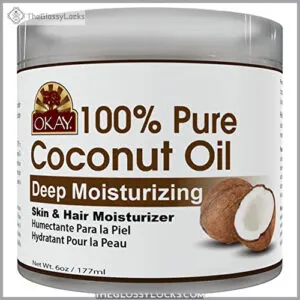
Next up, consider Okay’s Coconut Oil for Hair and Skin, a 100%-natural oil that conditions, heals skin, and stimulates collagen growth. Formulated with pure coconut oil, this versatile product moisturizes all hair textures, treating dandruff, frizz, and thinning.
It cleanses skin gently, removing residue while nourishing dryness. The quick-absorbing oil leaves no greasy residue.
- Moisturizes hair and skin
- Stimulates collagen and repairs skin
- Cleanses gently without drying
- Can melt if shipped in hot temperatures
- Not enough info on absorption for low porosity hair
Coconut Oil Shampoo Moisture Boost
- Hydrates and softens hair
- Repairs damage from bleach
- Color-safe
- Works for fine and thin hair
- May not lather much
- Could weigh hair down for some
Can Coconut Oil Damage Hair?
After learning about the best coconut oils for vibrant, healthy hair, you may wonder if coconut oil can actually damage your locks. Rest assured – when used correctly, coconut oil nourishes hair incredibly well. However, some common misconceptions exist.
- Applying too much oil without properly distributing it through your strands may leave hair limp and greasy.
- Additionally, rubbing pure coconut oil directly onto your scalp can encourage overgrowth of naturally occurring fungi and cause irritation.
The key is moderation. Use coconut oil as a conditioning treatment on the lengths of your hair, not the roots. Pair it with gentle shampoos to lift excess oil without stripping hair. Ultimately, this ayurvedic approach of oiling hair before washing makes strands strong and shiny.
When to Not Use Coconut Oil in Hair
Two cases when you shouldn’t use coconut oil in your hair are if you have:
- Fungal infections on your scalp
- Very fine, low porosity hair
Those with seborrheic dermatitis or other fungal conditions should avoid coconut oil, as it may exacerbate symptoms.
Additionally, fine or thin hair with low porosity struggles absorbing oils. Coconut oil may weigh such hair down, making it limp and greasy. It can also lead to buildup on the scalp. Those with these hair types are better off using lightweight oils like grapeseed or argan that won’t overload the hair.
Also consider your styling preferences – skip coconut oil if you dislike heavy products or aim for more volume. Understanding your hair’s properties and needs is key to determining if coconut oil hair treatments suit you.
Aftercare
You’ll want to continue using coconut oil after coloring for optimal results.
Applying coconut oil one to two times per week post-coloring is crucial for maintaining vibrancy and preventing premature fading over the long term.
Use coconut oil as a nourishing hair mask by working it into damp hair and allowing it to sit for at least 20 minutes before rinsing out.
The fatty acids penetrate the hair cuticle to provide deep hydration while the lauric acid helps lock in hair color.
Alternatively, apply a few drops of coconut oil to the midshaft and ends of towel-dried hair as a conditioning treatment.
High quality coconut oil products like Vita Coco contain antioxidants to further protect color-treated hair from damage.
Consistent coconut oil use sustains richness and prevents dullness.
Make it an integral part of your weekly hair care regimen for enduring color brilliance.
Alternatives to Using Coconut Oil
Otherwise, have you considered alternatives if coconut oil doesn’t work for you? There are a few suitable natural oil options:
- Olive oil as an emollient
- Avocado oil for moisturizing
- Argan oil to smooth and protect
- Grapeseed oil for lightweight conditioning
These oils offer protective treatments without weighing hair down. Other alternatives include protein-rich hair masks with collagen or keratin. Look for options free of sulfates, parabens, and silicones. Shea butter also makes for an effective emollient scalp treatment before and after coloring.
While coconut oil has many benefits, ingredients in quality hair care products can also prep hair beautifully for vivid, lasting color. Consider sampling an array from natural brands like Shea Moisture, Naissance, Cantu, Mielle Organics, and more to find your best fit.
Is Henna Good for Your Hair?
After exploring coconut oil as a pre-coloring treatment, let’s shift our focus to henna hair dyes.
Henna offers some clear advantages over traditional hair dyes:
| Benefits | Drawbacks |
|---|---|
| Conditions Hair | Messy Application |
| Adds Shine | Can Cause Dryness |
| Long-Lasting Color | Limited Color Range |
| No Harsh Chemicals | Requires Maintenance |
The nourishing properties of henna can strengthen hair over time. But take note of the preparation process and required upkeep. Test a small amount first to ensure your hair responds well. With proper use, henna can be a healthy and vibrant option.
Which Brands of Henna Hair Dye Are Best?
Two of the top-rated henna hair dye brands are Lush Caca Rouge and Light Mountain Natural Hair Color & Conditioner.
For vibrant red tones, try Lush Caca Rouge. With responsibly sourced henna leaves and essential oils, it offers ammonia-free, gradual coverage for gray hair and a safer alternative for covering chemical dyes.
For an organic approach, use Light Mountain’s plant-based dyes for subtle color with each application. With over 30 shades like black, brown, burgundy, and auburn, it nourishes hair with herbs and conditions strands.
When selecting henna dyes, research ingredients to avoid allergic reactions. Compare color outcomes, ease of application, and reviews. Ultimately, high-quality natural dyes like Lush and Light Mountain enhance hair health while gently depositing color.
Frequently Asked Questions (FAQs)
Does coconut oil lighten hair color?
No, coconut oil doesn’t lighten hair color. It moisturizes and nourishes hair, helping retain color, but doesn’t actively lighten existing pigment.
Focus on using color-safe, gentle shampoos and conditioners while avoiding harsh chemicals that strip color if aiming to maintain a lighter shade.
Can I leave coconut oil in my hair overnight before coloring it?
Yes, you can leave coconut oil in your hair overnight before coloring.
Allowing plenty of time for the oil to penetrate deep into the hair shaft optimizes its protective and conditioning benefits during the coloring process.
Rinse just before applying dye.
How often should I use coconut oil on my hair between color treatments?
Absolutely saturate your hair in coconut oil daily between colors—overdoing it’s impossible! Let it soak in fully overnight before shampooing.
Does coconut oil help cover grey hair when coloring?
Unfortunately, coconut oil doesn’t help cover grey hair when coloring. It conditions hair but has no dye properties. Focus on selecting an appropriate color shade and application method for best grey coverage.
What happens if I get coconut oil on my scalp when applying it before coloring my hair?
Don’t worry, getting some coconut oil on your scalp when prepping your hair won’t cause issues.
It may leave your roots looking a bit greasy until you wash post-coloring.
Just be sure to keep the majority of the oil focused on the hair lengths and ends for best results.
Conclusion
Reawaken your inner radiance with coconut oil’s nourishing touch before hair dye.
Like a vibrant phoenix rising from nourishing ashes, let coconut oil elevate lackluster locks into lustrous new life.
With damage prevention, protein restoration and unparalleled hydration, embrace hair’s destined glory – allow coconut oil to unlock dye’s dazzling potential, unveiling a sensational, smooth and sleek you.

